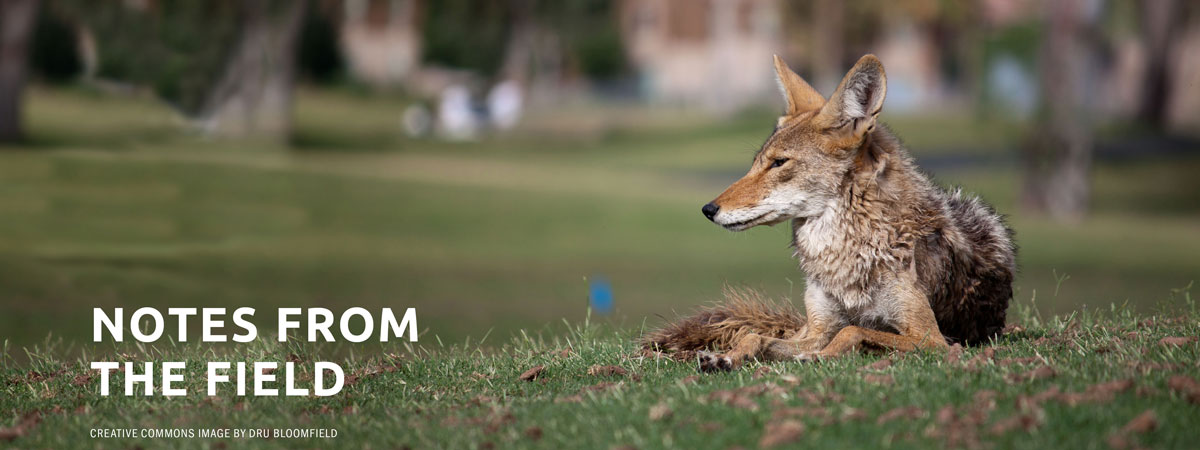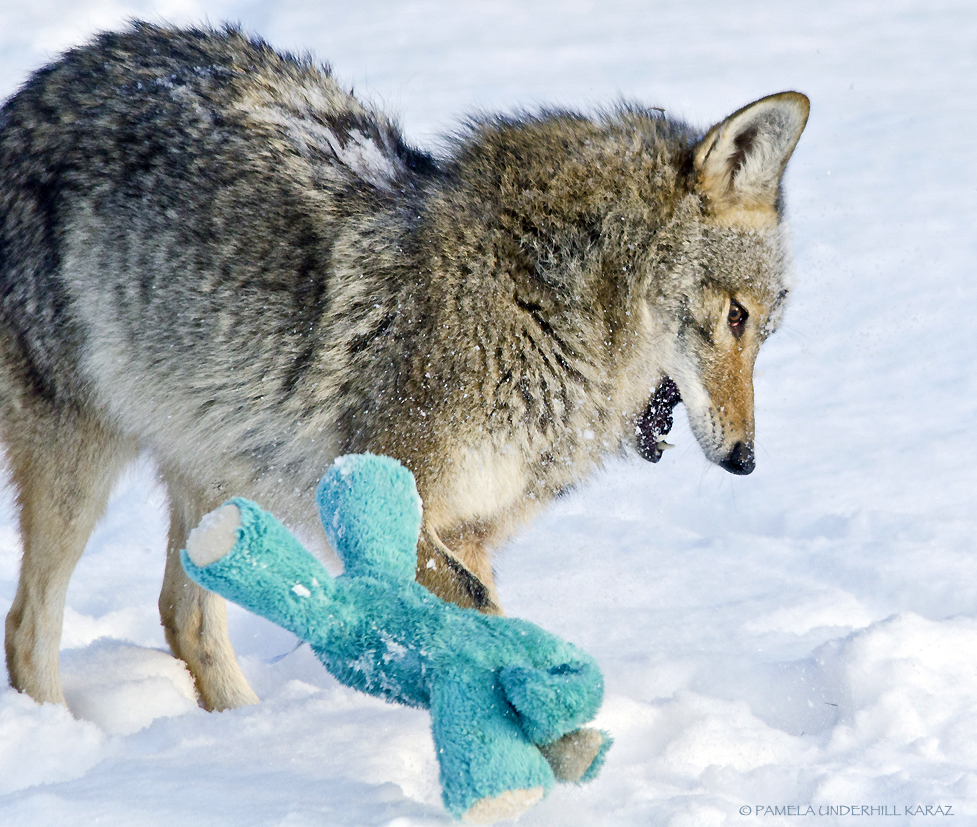Notes from the Field: Dr. Michelle Lute on the Latest Science About Coyote Diets and Behavior
In addition to working to change laws and policies to better protect North America’s wild carnivores, Project Coyote works equally hard to educate people about why coyotes, wolves, mountain lions, and other wild carnivores matter and how we can better coexist with them. One of the greatest challenges in that effort is the misinformation and myths that are perpetuated in the media and through forums like Nextdoor.
In this Notes from the Field blog, Project Coyote National Carnivore Conservation Manager Dr. Michelle Lute addresses a recent study published in the journal Scientific Reports that speculates on a dubious connection between urban coyotes eating anthropogenic diets and more aggressive behaviors. As Dr. Lute points out, making false assumptions about coyote behavior is potentially deleterious as it can lead to fear-mongering and misunderstanding about appropriate responses to the presence of coyotes.
Through Project Coyote‘s Science and Stewardship program, we strive for gold-standard science that ensures the most rigorous standards are uniformly applied to studies in order to make solid inferences and inform effective solutions. We are proud of our Science Advisory Board that includes some of the most respected wildlife biologists, ecologists, and social science experts in the field. They endeavor to conduct and publish the best science—adhering to gold standards—not only in their own research but also in support of Project Coyote‘s advocacy work. That’s why we think it’s critical to point out unsubstantiated speculation in a study when it has the potential to inject misinformation into the public sphere and limit our capacity to promote science-based conservation and coexistence strategies. This is one of those times.
I hope you enjoy this Notes from the Field blog authored by Dr. Lute.
For the wild ones – and for best science,
Camilla
Founder & Executive Director
One of our greatest challenges at Project Coyote is tackling the myths and assumptions humans make about coyotes, their behaviors, and intentions: “I saw a coyote during the day, he must be rabid!” or “Those coyotes were trying to lure my dog away so they could eat her.” Perhaps familiarity really does breed contempt or, perhaps more accurately, unfamiliarity breeds assumptions that are not necessarily accurate or favorable (but that phrase doesn’t roll off the tongue as easily).
Most, if not all, of the false assumptions about coyotes, underlie a perception that coyotes must be aggressive when in fact many of their behaviors are rooted in concern for their families or curiosity. Along these lines, a recent 2020 publication in Scientific Reports titled An altered microbiome in urban coyotes mediates relationships between anthropogenic diet and poor health by Scott Sugden and colleagues makes a highly speculative connection between anthropogenic diets and aggression, further engendering problematic assumptions about coyote behavior. In reality, no behavioral evidence exists to support the notion that urban coyotes are more aggressive. As the National Carnivore Conservation Manager for Project Coyote and a Ph.D. wildlife scientist with over 30 publications relating to animal behavior and human-carnivore coexistence, I address the wild speculation about not-so-wild diets.
Scientists are often faced with the dilemma of inaccurate perceptions or assumptions stemming from their studies. Sometimes the human brain mistakes correlation with causation. In this case, it’s a matter of combining various correlations with various degrees of separation: namely that coyotes eating human food could have altered gut microbiomes (in other words, shift the demographics of the typical bacterial community) which could lead to more aggression because aggression has been linked to altered gut bacteria in one study of 31 dogs of a similar breed. One study on such a small cohort of dogs should be taken with a grain of salt, and extrapolating between coyotes and dogs should be avoided (e.g., we see important differences even between more closely related dogs and wolves).
The attention this minor speculative study is receiving could needlessly erode our efforts to promote coexistence between humans and coyotes. Despite being the vastly more peaceful species of the two, coyotes and their behaviors are often misinterpreted. For instance, coyote parents are known to engage in escorting, whereby they follow at a distance a stranger intruding too close to their den. This is not evidence of aggression by a sick or dangerous animal, but too often unknowing humans in this situation assume they are being stalked. At Project Coyote, we expend considerable effort educating communities across the U.S. about how to understand coyote behavior.
Scientists also study coyotes in numerous large cities across North America and we have a growing wealth of validated information about their urban lives. The evidence is increasingly clear: Urban coyotes are not more aggressive than their rural counterparts. They may tend to be bolder and have lower flight responses, but we would expect that response as adaptive in an urban environment. We all become habituated to repeated stimuli that are at first stressful but with time are determined to be harmless. Think of a partner’s or sibling’s alarmingly loud snoring that you eventually learn to ignore. Problematic habituation may occur when humans intentionally or unintentionally feed coyotes. Human-coyote conflict, although rare, is often linked to food conditioning, injury or illness. Of course, many factors may play dynamic roles in influencing coyote-human interactions across space and time, from ecological parameters such as forest cover to social variables like risk perceptions.
So what should we take away from the Sugden et al. (2020) study? Communities that want healthy wildlife to observe and enrich their local environments should do their part to secure trash or compost, and to educate those well-meaning neighbors about the potentially unwelcome consequences of feeding our wild neighbors. However, science has not shown that eating human food makes coyotes more aggressive, so the next time you’re graced by a watchful coyote, enjoy the experience and wish her good health from a distance!
Further Resources on Coyote Behavior and Coexistence:
Coyotes and Humans: Can We Coexist? by Camilla H. Fox (2006)
Find our Coyote Friendly Communities™ resources here and even more reading about coyote behavior and ecology here.








